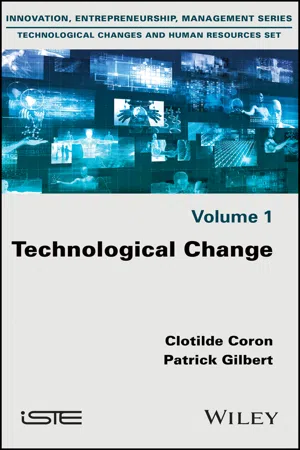
- English
- ePUB (mobile friendly)
- Available on iOS & Android
Technological Change
About this book
Technological Change
Technological change is exciting as much as it is daunting. The arrival of new digital tools affects consumption patterns, types of employment and working conditions, and can pose challenges to organizations and individuals alike. Indeed, although technological change is a factor for economic growth, it can also be an amplifier, or even a catalyst, of inequality. It is also a social change and interacts in complex ways: technology is both the source and the consequence of social transformation. To understand technological change and to harness its effects, this book studies transformations at different levels (societal, organizational and individual). In its analysis of the subject, it also draws on a number of disciplines of the human and social sciences, such as anthropology, sociology and psychology.
Tools to learn more effectively

Saving Books

Keyword Search

Annotating Text

Listen to it instead
Information
1
The Human and Social Sciences in the Face of Technological Change
1.1. Approaches to technological change
1.1.1. Technological determinism
1.1.1.1. Technology as an element in determining social behavior
- – daughter of science, technology is an autonomous variable;
- – a society is determined by the technologies in use;
- – the technical evolution is linear, due to the irreversibility of the technologies;
- – for better or for worse, the technological imperative is imposed on everyone: it is inevitable and universal.
Box 1.1. The effects of the invention of radio (source: Ogburn, 1933)
1.1.1.2. Technology, which holds promise
Table of contents
- Cover
- Table of Contents
- Introduction
- 1 The Human and Social Sciences in the Face of Technological Change
- 2 Technological Change and Society
- 3 Technological Change and Organization
- 4 Technological Change and the Individual
- 5 Experiencing Technological Change
- References
- Index
- End User License Agreement
Frequently asked questions
- Essential is ideal for learners and professionals who enjoy exploring a wide range of subjects. Access the Essential Library with 800,000+ trusted titles and best-sellers across business, personal growth, and the humanities. Includes unlimited reading time and Standard Read Aloud voice.
- Complete: Perfect for advanced learners and researchers needing full, unrestricted access. Unlock 1.4M+ books across hundreds of subjects, including academic and specialized titles. The Complete Plan also includes advanced features like Premium Read Aloud and Research Assistant.
Please note we cannot support devices running on iOS 13 and Android 7 or earlier. Learn more about using the app